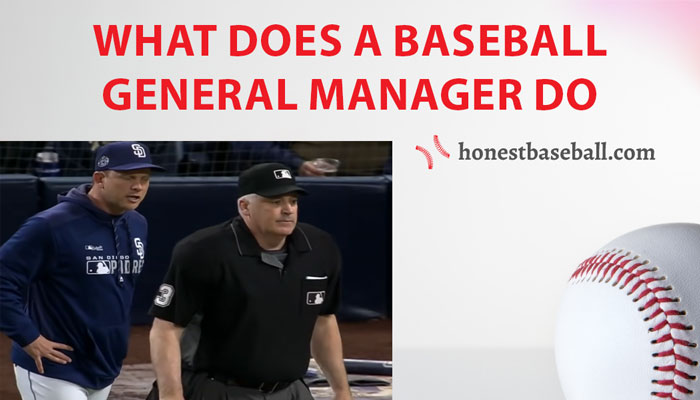Do you ever wonder, “What Does A Baseball Manager Do?” Why are they getting paid so much even if they are not playing on the field? Many others have similar questions. You are not the only one.
Teams in baseball are as strong as their performance on the field. What does a baseball manager do besides set the lineup and batting order? Do they get off their duties after that?
Managers go through a lot of work than you might think. You may not see it because it all happens in the background. Let’s find out more about what roles baseball managers play to keep a team alive.
What Does A Manager Do In MLB?
A manager must bring the most out of a player’s talent. As long as you can get the most out of your players and keep them playing every day, you will be as good as you can be.
You must keep the right buttons, but they only work if the players obey. A team’s unity depends on how well each player is integrated into the group and how they work together to achieve a common goal.
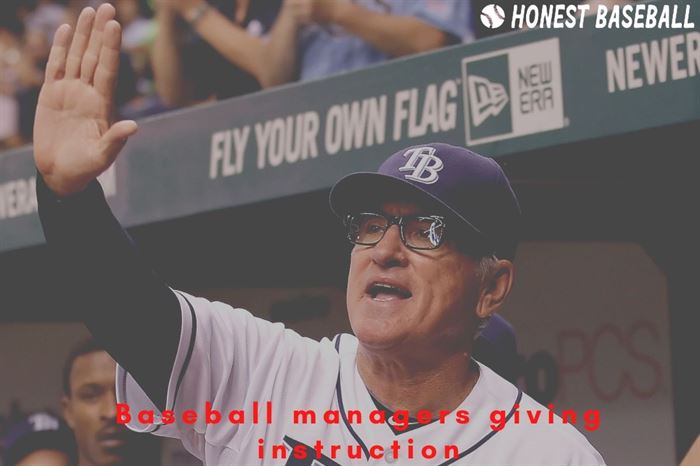
That said, if you are just going to play for yourself, make sure you play well. As long as your performance is that high, you can tolerate it. As for your approach to the race, remember that this is a long one, and sometimes you just have to go through the motions for your teammates.
You have to be honest with them from time to time. Although it is a rewarding position, the work is challenging.
The majority of the work occurs when you meet with various people regularly. Today’s bulk of my work is to continue training the players who arrive so early.
You are in the classroom every day. Should presume they do not know, but you can not treat them like children.
You must treat them with respect and decency, befitting a man. Typically, you learn what they do not grasp after making a mistake.
My job is heavily reliant on the efforts of my coaches. I am in control of everything, but I am supposed to let each department do its own thing without me interfering too much.
Personality management skills are an absolute need. That can not be overstated. 25 minds, 25 egos to deal with.
The 25 players you are most interested in learning about are the ones who will play for you and give it their all every day. If the players have faith in you, you have already won half the game.
The 25 guys taught me how hard baseball is, and I hope I remember that when I retire, lead, or manage. That is something you can not forget.
As a manager, it is your responsibility to convey to the players that you are aware of the difficulty of the game. The most challenging part is dealing with people’s different personalities.
Roles Of A Baseball Manager
Roles of a baseball manager and coaches are not the same. Before understanding Why Are Baseball Coaches Called Managers, you need to be acquainted with the key responsibilities and tasks related to the manager.
General managers of baseball teams are responsible for recruiting coaches, players, analytics experts, public affairs experts, and other employees.
The success or failure of a baseball team may be significantly influenced by its manager. An effective manager must be wise in their recruiting decisions, and this requires a full awareness of a person’s abilities.
As a result, they must have incredible talent and an awareness of making wise personnel decisions without overspending.
Organize A Team Before The Game
A competent manager takes much effort to put together his squad. He has a positive effect on his players’ morale and self-confidence. A player’s performance improves when they know that someone is rooting for them.
Line-Up
The baseball manager sets the lineup. MLB managers receive advice from coaches, players, or even front-office employees like any successful leader.
A good baseball manager must consider player output, health, the rival pitcher, and team morale while putting up a lineup.
Most MLB teams have sophisticated analytic analysts who advise the manager daily on his lineup, depending on the stats.
The manager’s role requires extensive experience in the art of lineup creation. It affects the team’s victories and losses, affecting the players’ spirits.
The fans often criticize a manager’s starting lineup. You can put together a line-up in a slew of ways.
Traditional lineups have a fast pitch pitcher at the top and a slugger in the center, whereas current lineups depend on analytics.
In-Game Planning
Managers may use various in-game strategies, including making substitutes while the game is still in progress, among others.
A baseball manager can assign most of these duties to his coaching team, yet he still chooses the overall plan and when to deploy these strategies throughout the game.
Coaches on their staff may also be subject to direct orders from the boss. Some managers delegate because they have too much to do during the game.
No matter who is in charge of implementing the plan, the manager is the one who will have to face the media if any decisions made during the game were unwise.
Each manager’s in-game approach is unique. These judgments typically rely on team members.
Faster teams are more likely to steal bases than slower ones. Defensive alignment changes are more familiar with teams who adhere to the defensive shifting philosophy.
As a manager, you can make a lasting impression on a squad with your in-game tactics.
Maintaining Focus On Long-Term Targets
Regular baseball season games in baseball last 162 days. Every game in a baseball season brings a host of short-term objectives. There could be short-term objectives such as winning a division series from a team standpoint.
Some teams struggle in the bullpen and spend a few weeks working on defining roles and boosting player confidence in the bullpen. Major league baseball teams face an almost infinite number of short-term objectives throughout a season.
It is difficult for a manager of a contender club to focus on immediate problems while simultaneously keeping an eye on the bigger picture of the whole season. Keeping track of a player’s workload is essential to reducing the danger of a player being injured.
If a player is overworked, they may be forced to sit out a crucial regular-season game. In the long-term, it protects the athlete from injury and assures he will be ready when it matters most.
The management should be disciplined to maintain long-term concentration. Regular-season game fans often dislike it when their favorite players are rested for essential contests.
This may not be popular with even the most passionate of gamers. However, the manager must bear the responsibility and clearly understand how to handle these circumstances.
Setting The Stage For Excellence
A baseball manager must be able to micromanage players. It includes instructing the players and interacting with the individual player. However, a manager in the Major Leagues must have macro-level solid leadership skills.
Can he create a culture of responsibility and quality that motivates and inspires players?
This is far simpler to say than it is to do. Understanding what Major League Baseball players want and need requires years of expertise.
These are the kind of good energy a manager can instill in a baseball team-
Accountability
A baseball team manager is responsible for enforcing team regulations and ensuring that the players adhere to them. These include coming to the training on time and doing on-field activities.
Elite competition abounds in Major League Baseball. If a player or team does not take the game seriously, they have no chance of winning. It is the job of a baseball manager to establish commitment in his players.
Mood
The clubhouse must have a cheerful atmosphere. The baseball manager must ensure that the players and coaches have a positive experience.
Keeping an eye on responsibility is an absolute must here. A chaotic locker room might be entertaining but not productive.
A manager must obey standards while letting his players feel free, calm, and pleased. The manager’s attitude has a significant impact on this.
Does he get along well with other people? Is he straightforward and truthful? Is he a good communicator? These things are essential.
Team Management
The management of the baseball club heavily influences the choice of team leaders. The absence of a named captain is a personal preference for specific teams.
But a manager must know who his key players are and let them help him create a winning culture on and off the field.
Confidence
When it comes to self-confidence, baseball hits lows unmatched by any other sport. A batting drought may be pretty unpleasant. A manager must encourage and inspire players.
The manager must know what inspires and boosts each player’s confidence.
If you are going through a hard time hitting, tee ball and Muhl ball can help you maintain your form.
Long-Term Objectives
When playing in the Major Leagues, baseball is a hardship you have to put up with every day. Extreme highs and lows might cause players to lose concentration and become short-sighted.
A baseball manager must keep season-long objectives in mind amid the day-to-day grind. A manager will depend on senior players to coach young players about what it requires physically and emotionally to play 162 games plus the playoffs.
Answering Media Questions
In the eyes of the public, a Major League Baseball manager is the team’s public face. At the start and after every game, they interact with journalists. Even though it is an essential component of the job, most managers in Major League Baseball are woefully lacking in this area.
Flexibility and strong communication skills are necessary for answering complex inquiries. Major League Baseball managers are hired primarily for their baseball knowledge, and as a consequence, they sometimes lack the communication skills required to work effectively with the media.
Managerial breakdowns in front of the media have been well-documented. As a manager of the Kansas City Royals, Hal McCrae had a breakdown.
After losing a game, McCrae was asked a difficult question concerning in-game tactics, and he exploded. A competent baseball manager does an excellent job representing the team’s interests.
To inspire their players, managers may utilize the media. They can praise individual players or the team in front of the press to raise team confidence.
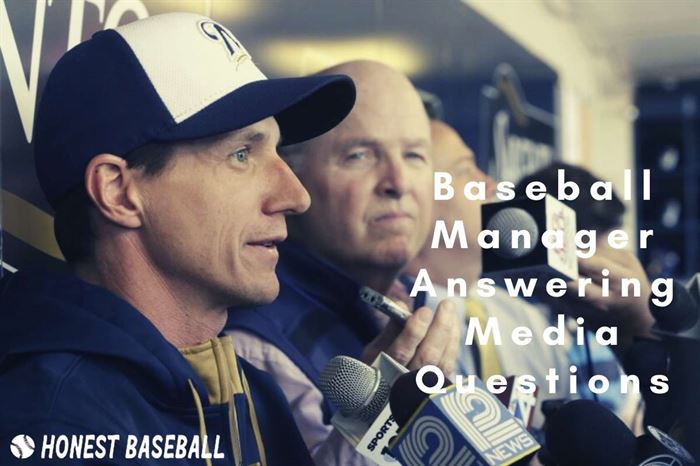
What Qualities Make A Great Baseball Manager?
A good manager is well-prepared and spends a lot of time preparing with his staff and getting ready for every match and season. He is excellent at communicating with his players, and he will sit on them if necessary if there is an issue.
Being an effective manager requires an understanding of many different factors. It is not simply about winning and losing since it relies on the quality of the players. Also, he needs to handle media, front office staff, and the owners.
Generally, it is much simpler to manage a group if you have talented players. They all have the same general philosophy, but how they work their pitching staff and bullpen is crucial.
The way a team uses its roster throughout a season, as well as the players on it, is essential. Most people are unaware of what happens behind the scenes.
A baseball manager undertakes more daily tasks. They fill up the team sheet, make alterations, inspire the players, and address media queries.
The baseball manager and the general manager work together throughout the summer and during the regular season to develop a successful club. Lastly, a baseball manager must be aware of recent and past regulation changes.
What Keeps You Away From Being A Great Baseball Manager?
Everyone who has ever had the opportunity to teach baseball has understood that you can not satisfy everyone. Nonetheless, it is one of the truths that any coach must accept when donning the jersey.
You might easily make mistakes while coaching, but that is the price of experience. Best of all, eliminating them should lead to a more gratifying and enjoyable environment for the players you serve.
Look out for these pitfalls while you are coaching your team-
Consistently Using The Same Method
The routine is effective. But repeating every exercise is a bit excessive. Plus, you or anybody else may not have the perfect practice plan that includes every facet of team preparation.
In order to be an effective manager, you must set aside the time necessary for thorough planning, careful consideration, and meticulous attention to detail. As a bonus, it keeps things exciting and can even be enjoyable if done well.
Canceling practice
What an exciting moment to be working with the players. There will be fewer participants, more coaching, and more one-on-one work. You can not allow a few no-shows to rule your whole day! When they lose, other people win BIG.
Do Not Be A Pessimist
Saying a youngster can not play is simple; taking a risk and seeing what a player can do is far more complex. Be a mentor first.
Your coaching should be based on a positive, growth-oriented perspective. There are just too many negatives for youngsters to take away from the playing field.
Maintaining The Same Batting Order
Youth league baseball does not need to be concerned with this issue since it does not occur in professional baseball. Try to give youngsters a variety of opportunities at the plate and let them taste what it is like.
Your goal is to build up your self-esteem, not destroy it. You never know what will happen.
Team Defense Fails
So a rundown was screwed up, or an infield pop-up broke down? Did you put it into practice?
If they have not done it before, it is not their fault. Since no one can be flawless at all they practice, do not hold your breath for the perfect evening of progress.
You Overlooked The Sign
Never assume that your athletes know the signs just because you reviewed them six months ago. Make sure your players are familiar with your sign system and keep it as simple as possible by using the fewest signals feasible.
Mistreating Your Star Player
It is a team, and everyone is on an equal footing. All players should face the same penalty, regardless of their standings.
Unless you are willing to sacrifice your whole team for one player. It will be a win-win situation for you, him, and the entire team.
Managerial Errors
Baseball managers make sly judgments that the human eye can not see. They seem to be constantly engaged in some kind of strategy game, if nothing else.
Every sport has excellent and lousy management, just as there are great and bad coaches in every other sport.
Even the best managers make mistakes from time to time. Some managers know every game detail and understand what their teams need. Others lack such characteristics.
Managers throughout baseball have made many mistakes, but these are some of the stand out as the most catastrophic.
Terry Bevington
This management gaffe is at the top of my list, as well as in the annals of history.
It started when the Chicago White Sox sacked manager Gene Lamont during the 1995 season and appointed Terry Bevington to the management. Despite having a successful record as Sox manager, Bevington committed an error in history.
In a September 1997 ballgame, the Red Sox led the Indians 3-0 going into the eighth inning. The South Siders’ Tony Castillo took the mound as the game’s fourth pitcher. After getting two singles by Bevington, Castillo was pulled from the game and then turned to his poor bullpen.
On the next pitch, Jeff Darwin allowed a single to Manny Ramirez, the very first hitter he faced. Bevington called up Tom Fordham from the bullpen to get out of the jam.
He surrendered a run-scoring single and a compromise fly to the first two guys he faced. Suddenly the Indians were one run away from tying the game at three.
As a result, Bevington emerged from the bench and called for a right-handed reliever from the bullpen. However, there was not a single right-handed player warming up.
There was not even one pitcher in the bullpen. When the phone rang, Keith Foulke answered it chilly. To warm up the bullpen, he purposely walked the first hitter to face him in the batting order.
Joe Torre
Mariano Rivera is baseball’s best closer ever. Throwing the cutter pitch with such accuracy and power was an art form for him.
Throughout Jeff Weaver’s career, he was a mediocre pitcher. Joe Torre’s decision to use Weaver instead of Rivera in 2003 World Series Game 4 was baffling.
A group of Yankee pitchers threw ten excellent innings for Torre. In the bottom of the eleventh inning, manager Joe Torre decided to go with Weaver. instead of handing the ball off to Rivera
Weaver had not pitched at all in the postseason, and his ERA during the regular season was almost 6.00.
Weaver came very close to justifying the move. He had a solid eleventh inning, but he allowed the winning home run to the Marlins in the twelve innings, which led to them winning the game.
Tony LaRussa
I think the 2011 world series was quite odd. It had many weird moments. The Cardinals’ bullpen meltdown in Game 5 was the most bizarre of them all.
Tony LaRussa’s bullpen is well-known for its extreme specialization. He constantly made many alterations and enjoyed matches.
LaRussa made two adjustments to the starting pitcher’s position in a concise amount of time. He began his career with Octavio Dotel and progressed to Mark Rzepczynski and then Lance Lynn. That makes sense, doesn’t it?
Usually, it would be the case. LaRussa had no intention of putting Lynn on the mound, though. Lynn was not meant to throw that day at all.
LaRussa has Jason Motte on his list of possible starters. LaRussa’s bullpen coach misheard him and loosened up Lynn.
This was out of this world. As long as he knows what is going on, it does not matter whether the phone is broken; it is his duty to figure it out.
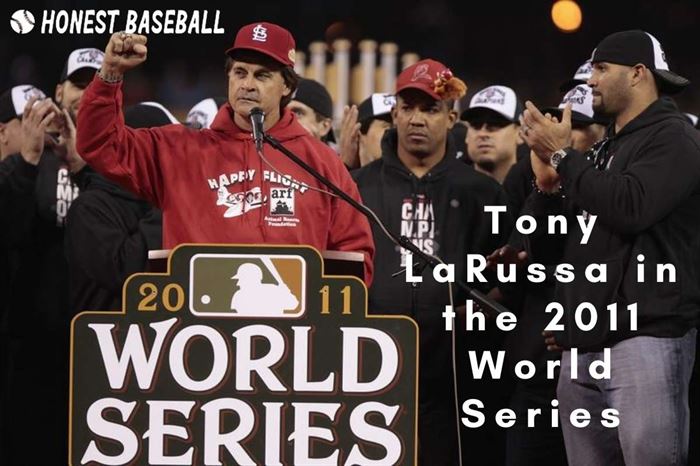
Pete Rose
Pete Rose’s baseball betting is one of the sports’ worst choices.
Rose’s bet as the Reds’ manager is an obvious pick for the worst management blunder.
Rose did not commit a heinous in-game managing blunder, but he did perform an awful behavior. Most fans have forgiven him, but baseball’s hierarchy may never.
Rose did not place bets on Reds games, although he made place bets while employed by the organization.
In any case, Charlie Hustle made a mistake here, regardless of how he slices it down the middle.
Do You Need A Manager In Baseball?
Are baseball coaches influential? A baseball manager’s personality and actions create the tone, which is sometimes forgotten in the age of analytical data.
In most cases, managers play an essential role. For every tale about a baseball team that triumphed because the right manager was discovered.
The most significant evidence of a manager’s effect tends to be a team’s general chemistry, even though statistical data may be challenging to collect. Most front offices feel managers play a key role in managing egos and fostering a solid team culture. What do you think?
You can also call it relationship management.
Some management activities may be exaggerated. According to numerous sabermetricians’ websites, in-game calls to gain modest advantages do not achieve long-term results.
According to statistical study, it does not make much difference whether you ask for a steal or order a bunt.
A team’s play style is heavily influenced by its manager, though, and this includes the ability to bat more aggressively, play defensively, or attack an opponent in a unique manner. When a baseball manager wants his player to put in consistent practice time, he sets a comprehensive baseball practice plan.
Seasonal changes are evident. However, these management techniques are not utilized during games, just preseason and practices.
If a manager does not win over the players in the locker room, he is no longer a valid boss. When their players pay no attention to their managers, managers cannot encourage their teams.
In many situations, this is the reason managers are terminated.
Frequently Asked Questions
1. What Makes A Good Baseball Manager?
A competent manager inspires the team to perform at the highest level. It does not matter what the coach or manager does on the field or in the dugout; teams are looking for a little bit of inspiration from them.
2. What Is The Difference Between A Coach And A Manager In Baseball?
In baseball, a team’s seamless operation is assisted by several coaches. Their job is to assist in making lineup and substitution decisions for the manager, who is in charge of making such decisions. More than a half-dozen coaches may help the manager in managing the squad in addition to the manager.
3. Why Are Managers Called Skippers?
Why is the team captain known as the skipper? Skipper is derived from the Dutch term Schipper, which means “shipper.” The term “skipper” refers to a person in charge of a vessel, such as a boat or a ship.
4. Do Baseball Managers Have Numbers?
The managers and coaches of Major League Baseball teams wear jerseys with numbers since the players do as well. Baseball is the only sport in the US where coaches and managers wear uniforms.
5. Why Do Baseball Managers Dress Like Players?
Coaches in professional baseball still wear jerseys because they used to wear them back when player-coaches were more common than they are now.
To this day, the wearing of uniforms by coaches is still seen as a characteristic of baseball because of its deep roots in superstition, rich history, and prevailing culture.
Final Words
So, what does a baseball manager do? In summary, baseball managers play a critical role in motivating players to play at their best level.
While the GM constructs the team, the manager needs to play with the chess pieces they have from the GM to win. While data analytics and more are taking over the sport of baseball, there is merit in having someone in the clubhouse and dugout who can motivate the players to be winners.
Be passionate about what you love, and I hope success will come at your door, whether you want to be a successful baseball manager or player. Work hard and make every day count.
You Might Also Like-
Why Are Baseball Coaches Called Managers
How To Swing A Baseball Bat Correctly
How To Teach Sliding in Baseball In Proper Ways
Can You Use Metal Cleats In High School Baseball
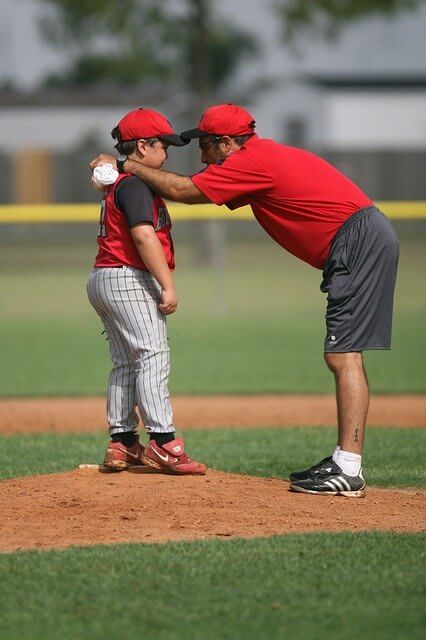
Hello everyone. My name is Jason Butler, and I live in California, America. I was a professional AAA Minor League Baseball player. I lost my chance of playing MLB for injury issues, but I did not lose my love for baseball. I attended the coaching training program and am now working as a coach in a small school in San Diego.
I always love to share my experience and knowledge if that can help you. Play baseball, and stay fit.
